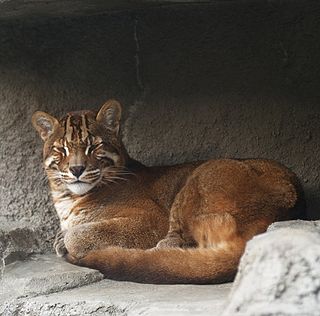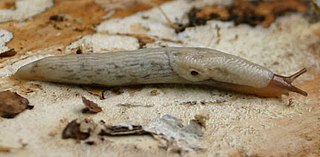
Catopuma is a genus of felid containing two small wild cat species, the Asian golden cat and the bay cat. Together with the genus Pardofelis it forms the bay cat lineage of felines. Both are typically reddish brown in colour, with darker markings on the head.

Prionailurus is a genus of spotted, small wild cats native to Asia. Forests are their preferred habitat; they feed on small mammals, reptiles and birds, and occasionally aquatic wildlife.

Leopardus is a genus comprising eight species of small cats native to the Americas. This genus is considered the oldest branch of a genetic lineage of small cats in the Americas whose common ancestor crossed the Bering land bridge from Asia to North America in the late Miocene.

Deroceras praecox is a species of small air-breathing land slug, a terrestrial pulmonate gastropod mollusk in the family Agriolimacidae.
Deroceras laeve, the marsh slug, is a species of small air-breathing land slug, a terrestrial pulmonate gastropod mollusk in the family Agriolimacidae.

Deroceras reticulatum, common names the "grey field slug" and "grey garden slug", is a species of small air-breathing land slug, a terrestrial pulmonate gastropod mollusc in the family Agriolimacidae. This species is an important agricultural pest.

Deroceras is a taxonomic genus of small to medium sized air-breathing land slugs in the family Agriolimacidae.

The Angolan fruit bat, Angolan rousette or Silky bat is a species of megabat in the family Pteropodidae. It is found in Angola, Burundi, Cameroon, Central African Republic, Republic of Congo, Democratic Republic of Congo, Kenya, Nigeria, Rwanda, Sudan, Tanzania, Uganda, and Zambia. Its natural habitats are subtropical or tropical moist lowland forest, moist savanna, and rocky areas.
Deroceras vascoana is a species of air-breathing land slug in the family Agriolimacidae. It is native to France and Spain.

Neniatlanta pauli is a species of small, air-breathing land snail, a terrestrial pulmonate gastropod mollusk in the family Clausiliidae, the door snails, all of which have a clausilium, a sort of sliding door.

Deroceras panormitanum is a species of air-breathing land slug, a terrestrial pulmonate gastropod mollusc in the family Agriolimacidae. This article is about Deroceras panormitanumsensu stricto, which occurs predominantly only on Sicily and Malta. Previous to 2011, this name was also applied to what turned out to be a distinct species, Deroceras invadens, a species which has spread around the world and is often a pest. Because this is a recent change in the taxonomy, for information on the species commonly referred to in the literature before 2011 as Deroceras panormitanum, please see Deroceras invadens.
Deroceras rodnae is a species of air-breathing land slug, a terrestrial pulmonate gastropod mollusk in the family Agriolimacidae.

The Hemigalinae are a subfamily of the viverrids denominated and first described by John Edward Gray in 1864. Hemigalinae species are native to Southeast Asia from southern China through Indochina, Malay Peninsula to Sumatra, Borneo and Sulawesi.
Deroceras juranum is a species of air-breathing land slug, a terrestrial pulmonate gastropod mollusk in the family Agriolimacidae.

Deroceras invadens is a species of air-breathing land slug, a terrestrial pulmonate gastropod mollusc in the family Agriolimacidae. Until 2011, this widely distributed species was known as Deroceras panormitanum, and earlier as Deroceras caruanae or Agriolimax caruanae, but Reise et al. (2011) showed that these names refer to a distinct species of similar external appearance known at that time only from Sicily and Malta. Consequently, although the more widespread species was already well known, it then had to be redescribed under the new name of D. invadens. Genetic evidence has indicated that D. invadens is native in southern Italy, including parts of Sicily, and possibly parts of central Italy. Elsewhere it has been introduced, predominantly within the last 100 years, but its spread has been constrained by cold winter temperatures.

The biodiversity of Colombia is the variety of indigenous organisms in the country with the second-highest biodiversity in the world, behind Brazil. As of 2016, 56,343 species are registered in Colombia, of which 9,153 are endemic. The country occupies the first position worldwide in number of orchids and birds, second position in plants, amphibians, butterflies and fresh water fish, third place in species of palm trees and reptiles and globally holds the fourth position in biodiversity of mammals.












